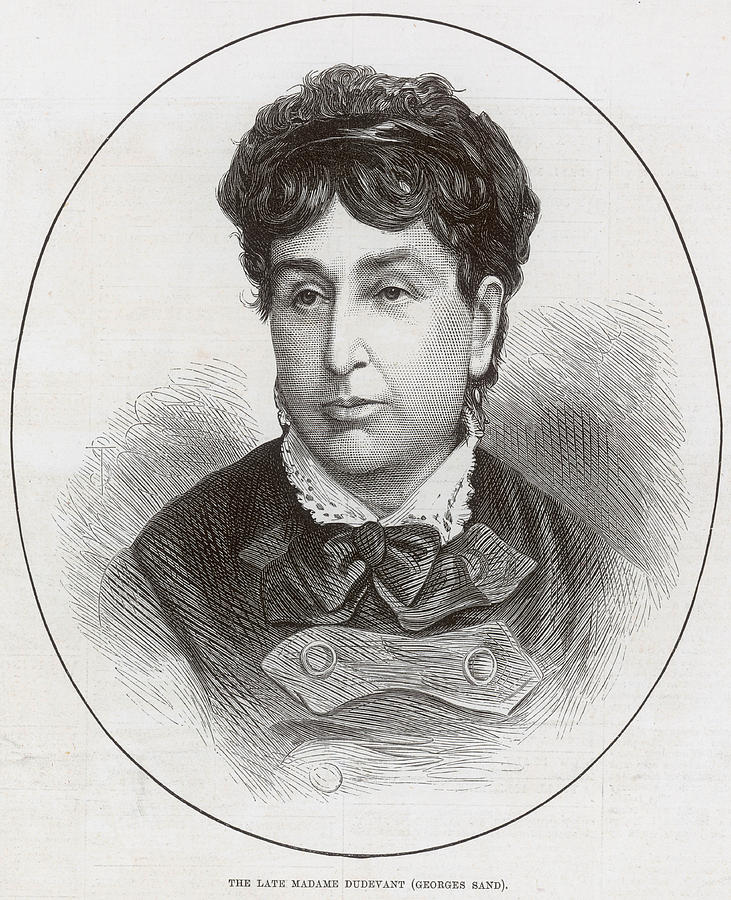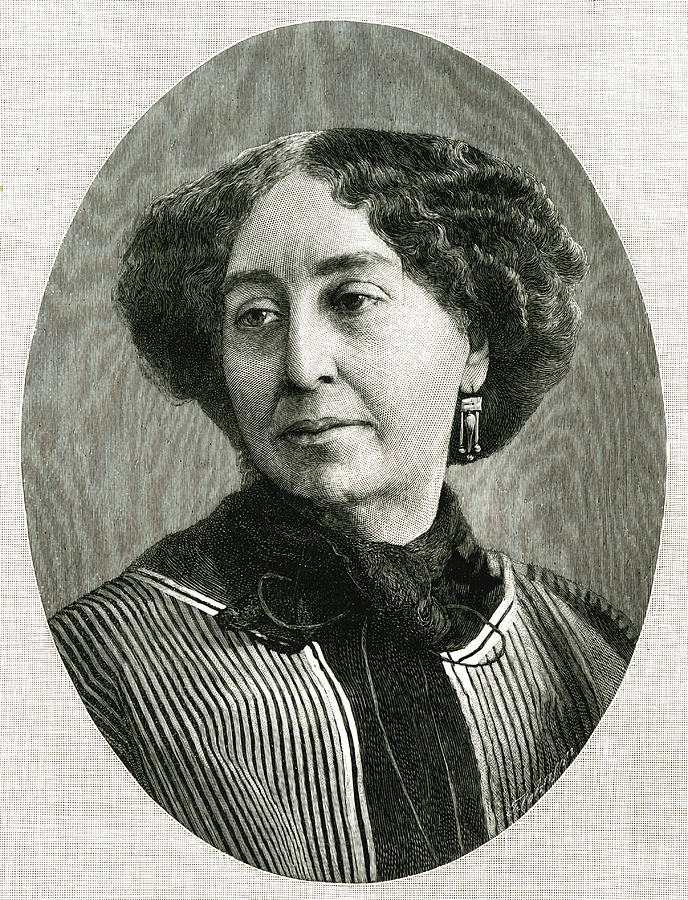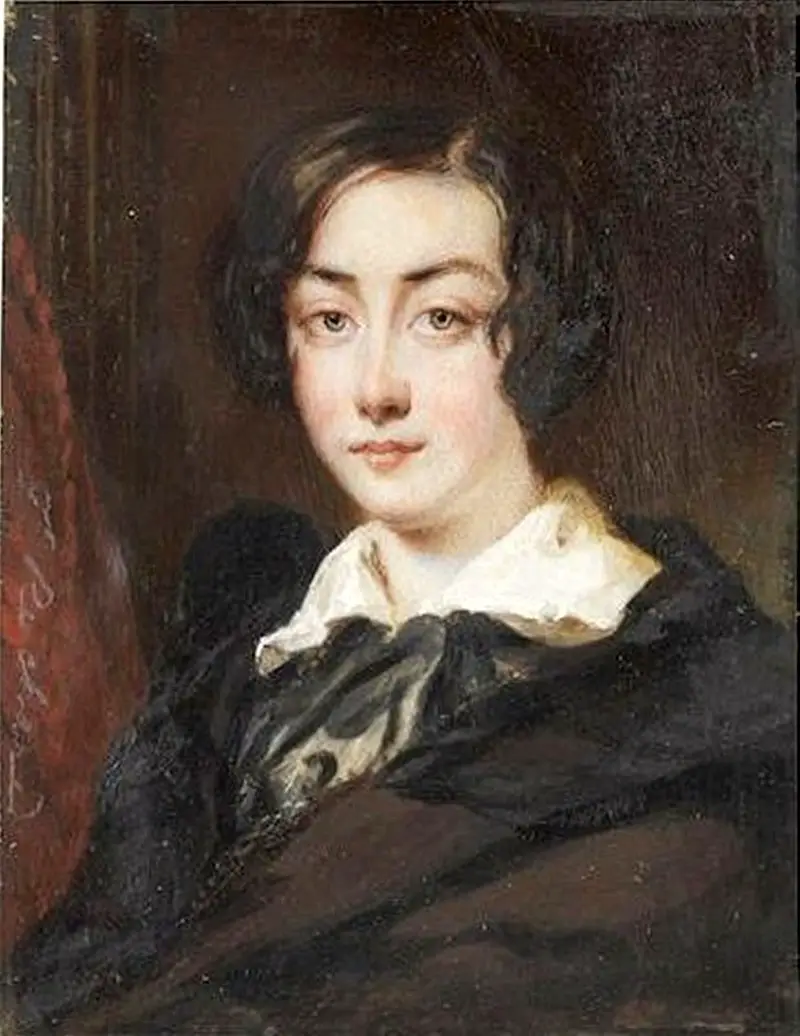
sand amandine aurore lucile dupin Black and White Stock Photos & Images Alamy
French literature - Sand, Realism, Naturalism: George Sand (Amandine-Aurore-Lucile Dudevant) was a dominant figure in the literary life of the 19th century, and her work, much-published and much-serialized throughout Europe, was of major importance in the spread of feminist consciousness. For a long while after her death, her literary reputation rested on works such as La Mare au diable (1846.

Amantine Aurore Lucile Dupin. French writer 1 July 1804 8 June... News Photo Getty Images
George Sand La nature est tout ce qu'on voit, Tout ce qu'on veut, tout ce qu'on aime. Tout ce qu'on sait, tout ce qu'on croit, Tout ce que l'on sent en soi-même. Elle est belle pour qui la voit, Elle est bonne à celui qui l'aime, Elle est juste quand on y croit Et qu'on la respecte en soi-même. Regarde le ciel, il te voit,

Aurore Dupin, Baronne Dudevant, dite Sand Algérie Pyrénées de Toulouse à Tamanrasset
George Sand. George Sand, orig. Amandine-Aurore-Lucile Dupin, (born July 1, 1804, Paris, France—died June 8, 1876, Nohant), French writer. During childhood she gained a love of the countryside that would inform most of her works. Married in 1822, she soon tired of her husband, Casimir Dudevant, and began a series of liaisons; her lovers.

Poeme Sur Aurore My XXX Hot Girl
Aurore Dupin Dudevant, also known as George Sand, was a descendant of a king of Poland on her father's side and of a Parisian bird-seller on her mother's. Her critics vilified her as a loose woman, a political radical, and a "lioness" who devoured her numerous lovers. She further shocked society by dressing as a man and smoking cigars.

Sand AmandineAuroreLucile Dudevant, née Dupin, was a Romantic novelist published under
Amantine Lucile Aurore Dupin (1804-1876) was an important writer and early feminist who wrote under a male pen name, George Sand. Regarded in France and beyond as a central figure of the French Romantic literary movement, Sand engaged with French artistic and literary society widely throughout her active period, conducting multiple.

Sand Alias Aurore Dudevant Drawing by Illustrated London News Ltd/Mar Fine Art America
George Sand is the pen name of Amandine Lucile Aurore Dupin, a French writer who lived from 1804 to 1876. Biography PDF Cite Share Article abstract: Sand contributed to nineteenth century.

Sand Alias Aurore Dudevant Drawing by Mary Evans Picture Library Fine Art America
SAND, GEORGE (1804-1876), French novelist. The greatest woman writer of nineteenth-century France, George Sand was born Amantine Aurore Lucile Dupin of "mixed" parentage. Her father was the illegitimate grandson of Maurice de Saxe (himself the illegitimate son of Augustus II, king of Poland) and her mother of proletarian background.

Extraordinara viață a scriitoarei Sand Dosare Secrete
The romantic and rebellious novelist George Sand, born in 1804 as Amantine Lucile Aurore Dupin, remains one of France's most infamous and beloved literary figures. Thanks to a peerless translation by Gretchen van Slyke, Martine Reid's acclaimed biography of Sand is now available in English. Drawing on recent French and English biographies of Sand as well as her novels, plays.

Aurore Dupin en 1810 par sa grandmère MarieAurore de Saxe. Musée de la vie romantique à Paris
This week Books & Writing celebrates the 200th anniversary of the birth of Aurore Dupin, better known to us as the French author George Sand.

Sand (Aurore Dudevant). French writer (1804 1876), Stock Photo, Picture And Rights
Born Amantine-Lucile-Aurore Dupin, 'George Sand' - as she became known - was born in Paris in 1804, the daughter of a soldier with blood ties to the Polish royal family. Her mother, meanwhile, was a prostitute. George Sand's life was destined to be unorthodox from the start.

sand editions de l aurore pas cher ou d'occasion sur Rakuten
The romantic and rebellious novelist George Sand, born in 1804 as Amantine Lucile Aurore Dupin, remains one of France's most infamous and beloved literary figures. Thanks to a peerless translation by Gretchen van Slyke, Martine Reid's acclaimed biography of Sand is now available in English.

Prolific French author of the 19thcentury, Aurore Lucile Dupin, Mme Dudevant, a.k.a.
À Aurore (de Contes d'une grand-mère, vol. 1: 1873) La nature est tout ce qu'on voit, Tout ce qu'on veut, tout ce qu'on aime. Tout ce qu'on sait, tout ce qu'on croit, Tout ce que l'on sent en soi-même. Elle est belle pour qui la voit, Elle est bonne à celui qui l'aime, Elle est juste quand on y croit Et qu'on la respecte.

Sand, l’inspiration jour après jour
À Aurore est un poème de Georges Sand composé de trois quatrains d'octosyllabes aux rimes croisées écrit en 1873. C'est un poème mettant en valeur la beauté de la nature qui nous entoure et l'importance d'en prendre soin. Il est adressé à Aurore, la petite-fille de la poétesse. La nature est tout ce qu'on voit,

À Aurore Textes poétiques Cultivons nous
George Sand (born Amantine-Lucile-Aurore Dupin; July 1, 1804 - June 8, 1876) was a French novelist, essayist, and playwright known for pushing the envelope on gender roles and cultural expectations. She's also notorious for the drama in her everyday life, not the least of which was her lively love life, filled with countless romantic entanglements.

George Sand. Aurore Dupin, au nom bien roturier, descend de l'une des plus grandes familles d'Europe, les Königsmark - une famille où, par tradition, toutes les filles s'appelaient Aurore. Aurora von Königsmark épouse, à la fin du xviie s., Auguste de Saxe, et en a un fils, Maurice. Passé au service du roi de France, Maurice, mercenaire.

Autoportrait de Sand vers 1830, signé Aurore. Collection du Musée Carnavalet, Paris
Aurore Dudevant adopted the pen name George Sand with the publication of her first single-authored novel, Indiana, in 1832. The trial for legal separation between the spouses began in 1836 and was finalized in 1838. Sand was awarded custody of Solange and later gained custody of Maurice as well.